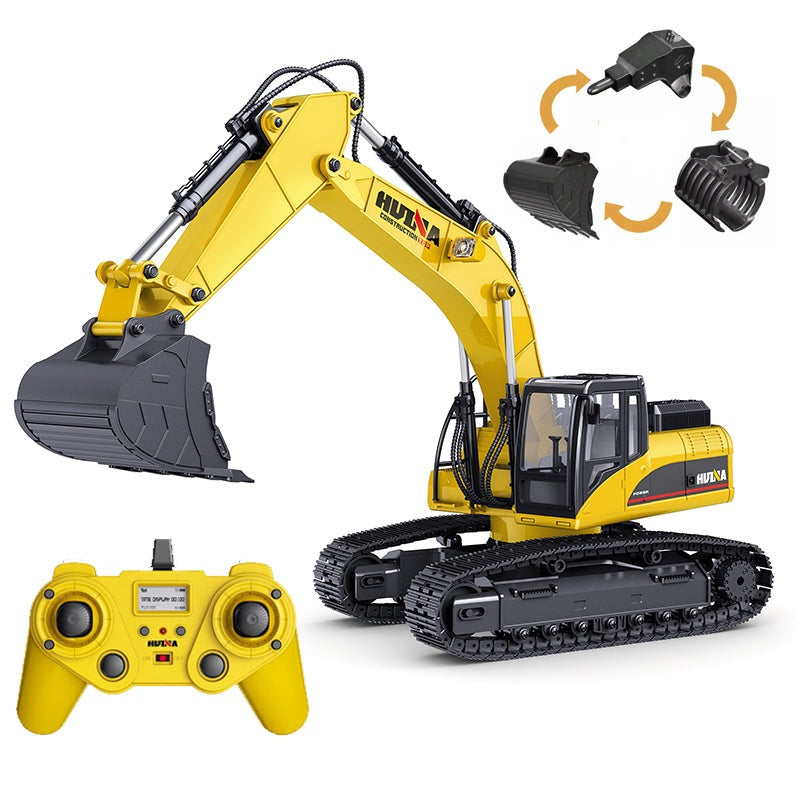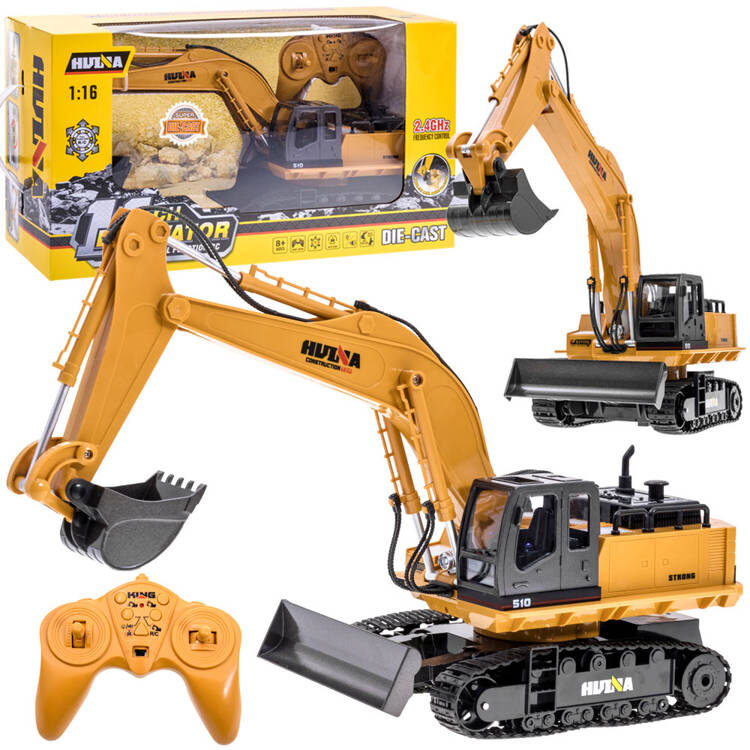Comprehending Just How Excavator Functions and Its Influence on Performance
Excavators play an important role in building and construction and mining operations, relying upon a complex interplay of hydraulic and mechanical systems. Their capability to do a variety of tasks depends upon both their design and the innovation integrated within. Recognizing these parts can considerably influence operational efficiency and performance. As innovations remain to reshape the sector, one need to think about how these changes will affect future techniques and performance.
The Essentials of Excavator Mechanics

The Duty of Hydraulic Systems in Excavators
At the heart of excavator operation exists the hydraulic system, which plays a critical duty in powering the equipment's features and motions. This system utilizes pressurized hydraulic fluid to move power, making it possible for numerous actions such as swinging, lifting, and excavating. By using the principles of hydraulics, excavators can do tasks with remarkable accuracy and pressure, enhancing general operational efficiency.The hydraulic system consists of essential components, including pumps, cyndrical tubes, and shutoffs, which work with each other to manage the flow and direction of the fluid. When the operator involves the controls, the hydraulic liquid is routed to specific cylinders, translating the operator's commands into physical movement. This mechanism permits responsive and smooth actions, which are essential in construction and excavation environments. double e volvo rc excavator. The effectiveness of the hydraulic system straight influences the performance and adaptability of the excavator, making it an indispensable element in modern-day excavation processes
Key Components of an Excavator
Understanding the key parts of an excavator is vital for comprehending exactly how this powerful device runs. An excavator contains numerous substantial aspects, including the undercarriage, house, arm, bucket, and boom. The undercarriage gives security and movement, typically including tracks or wheels to browse different terrains. The residence consists of the engine and hydraulic systems, enabling the driver to regulate movement and power the device. The boom extends from your home, allowing vertical reach, while the arm connects to the bucket, helping with excavating and lifting operations.Additionally, the taxicab houses the operator, outfitted with controls for accurate maneuvering. Each of these parts plays a vital role in the excavator's general capability, adding to its performance and effectiveness on building and construction websites. Comprehending these parts helps in keeping and enhancing excavator efficiency, making sure jobs are completed safely and effectively.
Add-on Adaptability and Its Benefits
Add-on convenience is a crucial aspect of excavators, making it possible for drivers to change in between different devices customized for particular tasks. This adaptability not just boosts job efficiency but also adds to cost-effectiveness by decreasing the demand for several machines. Understanding the different kinds of attachments offered can considerably influence the general efficiency and functionality of an excavator on task websites.
Kinds of Add-ons
While excavators are largely identified for their digging capabilities, their real versatility hinges on the broad variety of add-ons readily available. These accessories enhance the excavator's functionality, permitting it to execute various tasks past excavation. Typical attachments include pails (for digging and scooping), hydraulic thumbs (for realizing products), and augers (for piercing holes) Grapples are utilized for handling and relocating debris, while rippers can damage up hard surface areas. Other specialized accessories, such as plates and plows, allow excavators to adapt to specific job requirements. This diversity not just raises the machine's utility across different industries, including demolition, landscaping, and building and construction, but additionally enables operators to tailor their tools to fulfill details job needs effectively.
Boosted Work Efficiency
Maximizing task efficiency is a key advantage of using various excavator attachments. Different accessories enable an excavator to execute numerous tasks without requiring to switch over devices, saving useful time and labor. Using a hydraulic hammer can break concrete while a pail attachment can dig deep into dirt, allowing a seamless operations. This convenience minimizes downtime connected with equipment changes and enhances efficiency on-site. Additionally, specialized accessories boost precision in jobs such as grading or landscape design, causing greater top quality outcomes. The capacity to adjust to numerous visit work demands not only streamlines procedures but additionally reduces the need for extra machinery, guaranteeing that tasks are finished promptly and successfully. On the whole, add-on adaptability considerably adds to raised job effectiveness in excavation job.
Cost-Effectiveness and Versatility
Cost-effectiveness is a substantial advantage of making use of versatile excavator accessories. These attachments enable a solitary excavator to perform numerous jobs, decreasing the demand for additional machinery and labor - double e volvo rc excavator. By switching over in between containers, hammers, and grapples, drivers can take on different jobs, from excavating to demolition, thus taking full advantage of equipment use. This versatility not only decreases operational costs but likewise lessens downtime connected with changing equipment. Additionally, the capacity to tailor excavators with specialized accessories enhances performance, as they can effectively manage varied jobs according to task demands. In conclusion, the combination of cost-effectiveness and versatility in excavator add-ons adds to improved functional effectiveness and source allocation in construction and excavation projects

Advanced Innovation in Modern Excavators
Modern excavators are increasingly equipped with advanced innovation that transforms excavation procedures. Automation simplifies operations, while enhanced gas effectiveness lowers functional expenses. In addition, clever control systems enhance precision and safety and security, marking a substantial development in excavation tools.
Automation in Excavation Processes
As excavation modern technology progresses, automation has actually become a crucial component in improving effectiveness and precision on task sites. Modern excavators are equipped with sophisticated automated systems that facilitate jobs such as grading, excavating, and trenching with minimal operator intervention. These systems make use of sensing units, GPS, and equipment discovering formulas to guarantee exact placing and depth control, greatly lowering the margin for mistake. Additionally, automation permits drivers to focus on strategic decision-making instead of hands-on controls, leading to improved productivity in general. Such technologies not just simplify operations however also boost security by minimizing human error in intricate procedures. Subsequently, the combination of automation in excavation procedures stands for a substantial improvement in construction technology, driving the sector towards better effectiveness and performance.
Boosted Gas Effectiveness
Improvements in modern technology have actually also resulted in significant improvements in gas performance for modern excavators. Modern makers are geared up with sophisticated engines that optimize power outcome while minimizing gas intake. These engines use ingenious combustion innovations, such as turbocharging and direct fuel injection, to enhance efficiency and effectiveness. Additionally, lightweight materials in construction reduce overall weight, permitting less power expense throughout procedure. The introduction of variable speed controls makes it possible for drivers to adjust engine performance according to particular jobs, even more minimizing gas usage. Because of this, these improvements not only reduced functional expenses however likewise add to ecological sustainability by reducing emissions. On the whole, improved fuel performance in excavators is a crucial advancement that strengthens performance and financial feasibility in the building and construction market.
Smart Control Systems
While operators browse significantly intricate task websites, clever control systems in excavators have actually become vital devices for enhancing efficiency and precision. These sophisticated technologies utilize sensors and algorithms to monitor various criteria such as load weight, surface conditions, and functional performance. By immediately adjusting hydraulic functions, wise systems enhance maker efficiency, causing boosted performance and decreased wear on parts. Additionally, drivers benefit from instinctive user interfaces that provide real-time comments and diagnostics, enabling educated decision-making. This integration of innovation not just simplifies procedures but also minimizes human mistake, adding to much safer work environments. As the construction market continues to advance, smart control systems will certainly play an essential function fit the future of excavator performance and effectiveness.
Enhancing Functional Efficiency With Excavators
Excavators play a vital role in enhancing functional performance throughout various building and excavation tasks. Their versatility permits for several tasks, consisting of product, digging, and training handling, which simplifies operations and minimizes the need for additional devices. With powerful hydraulic systems, excavators can execute heavy-duty tasks with accuracy, significantly lowering the moment required to full jobs. The combination of innovative modern technology, such as GPS and automated controls, further optimizes their procedure, enabling drivers to accomplish better precision and reduce material waste. In addition, modern-day excavators are developed to eat much less fuel and reduce discharges, adding to both expense savings and ecological sustainability. By making use basics of excavators effectively, construction groups can boost efficiency, meet project deadlines, and improve total site management. This multifunctionality and efficiency make excavators essential devices in the modern-day building landscape.
The Future of Excavators in Construction and Mining Industries
As the building and construction and mining industries evolve, the future of excavators is poised for substantial improvement driven by technological technology and transforming operational demands. Advancements in automation and fabricated intelligence are reshaping excavator capabilities, permitting for improved precision and efficiency in procedures. Independent excavators are arising, lowering the demand for human intervention and minimizing the danger of accidents.Moreover, the combination of telematics and IoT modern technology allows real-time tracking of machine efficiency and anticipating maintenance, optimizing uptime. Green layouts, including hybrid and electrical models, are gaining traction, aligning with sustainability objectives within the industry.Additionally, making use of sophisticated materials and lighter designs improves gas performance while maintaining efficiency criteria. As these trends progression, excavators will play a crucial duty in meeting the raising demands for productivity and safety and security in building and mining, ultimately changing operational landscapes.
Frequently Asked Inquiries
Exactly How Do Climate Condition Impact Excavator Efficiency?

Weather problems considerably affect excavator efficiency, as rain and mud can hinder traction and security, while extreme temperature levels might influence hydraulic systems. Operators has to adjust to these variables to ensure ideal functionality and safety and security throughout operations.
What Precaution Should Operators Comply With While Utilizing Excavators?
Precaution for excavator operators consist of using suitable personal protective devices, conducting pre-operation assessments, making certain proper interaction with ground workers, keeping a secure range from overhead dangers, and sticking to well established functional protocols to stop mishaps.
Just How Frequently Should Excavators Be Maintained for Optimum Efficiency?
Excavators should be kept regularly to ensure peak performance, normally every 250 operating hours or as specified by the supplier. Regular checks boost integrity, protect against unforeseen failures, and extend the life-span of you can try these out the devices.
What Is the Ordinary Lifespan of an Excavator?
The typical life expectancy of an excavator generally varies from 10,000 to 15,000 hours of procedure. Aspects affecting durability include maintenance methods, operating problems, and the high quality of the device itself, affecting general performance and performance.

Can Excavators Operate Irregular Terrain Successfully?
Excavators can operate successfully on unequal surface because of their expressed styles and flexible tracks. These attributes enable them to preserve security and traction, enabling effective operation in tough environments typically experienced in construction and landscaping tasks. Each of these elements plays a vital duty in the excavator's overall performance, contributing to its efficiency and efficiency on building sites. Optimizing work performance is a main advantage of making use of different excavator accessories. While drivers navigate increasingly intricate work websites, clever control systems in excavators have arised as essential devices for improving effectiveness and accuracy. Excavators play an important duty in boosting operational effectiveness throughout numerous building and construction and excavation jobs. Developments in automation and man-made intelligence are reshaping excavator abilities, allowing for enhanced precision and performance in operations.